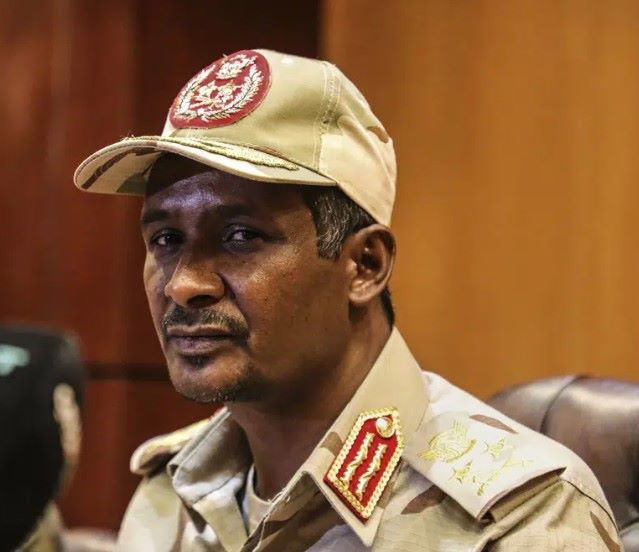The leader of Sudan’s Rapid Support Forces (RSF), Mohamad Hamdan “Hemedti” Dagalo, has employed global public relations firms to present his paramilitary unit as a force for good. The RSF and its leader have been accused of using social media to accuse the army of attacking civilians during a recent power struggle that erupted into violence in Sudan.
While critics argue that the RSF is using human rights language to distract from its record of human rights abuses, the group’s leader is portrayed as a benevolent man who is rescuing his nation from religious hardliners in the army. The army’s top brass is tied to Sudan’s political Islamic movement, which came to power through a coup by former authoritarian leader Omar al-Bashir more than three decades ago. For years, the military and RSF cooperated to commit grave human rights abuses across Sudan. However, top military officers have grown to despise the paramilitary force because they fear Hemedti could reduce their power and status if he gets stronger.
RSF accused of harming civilians
The Twitter and Facebook pages of the RSF – and those of its leader Hemedti – have been used to call for the army and RSF to exercise restraint and spare civilians. However, the RSF did not mention its own role in harming civilians, as witnesses and rights groups have reported. Witnesses and experts claim that while neither force has shown any regard for civilians, the RSF is cleverly using human rights language to distract attention from its atrocities. The group’s use of international law language is especially striking, according to legal expert Emma DiNapoli, who specializes in Sudan.
RSF emerges from “Janjaweed” militias
The RSF emerged from the “Janjaweed” militias that spearheaded mass killings in Darfur between 2003-2009. These militias were armed and recruited by the military government of al-Bashir to put down a rebellion by mostly non-Arab rebel groups, which were protesting the neglect and exploitation of Darfur by Khartoum elites. Four years later, al-Bashir formally repackaged these militias into the RSF. Early on, the group was looking to garner legitimacy by advertising itself as a reliable partner for the European Union to counter migration.
RSF seeks to rehabilitate its reputation
Flushed with power and money – thanks to capturing lucrative gold mines and leasing out mercenaries to fight for the Saudi-led coalition in Yemen – the group stepped up efforts to rehabilitate its reputation after a popular uprising forced al-Bashir from power in April 2019. The already steep task became even more difficult after RSF spearheaded an attack on a protest site, killing at least 120 people on June 3, 2019. The global community condemned the violence, yet Hemedti still ascended to a high position in Sudan’s military-civilian government formed two months later.
RSF seeks cooperation with international organizations
After the uprising, Hemedti was eager to cooperate with international organizations in the hopes of presenting himself as a palpable partner for the West. In December 2021, the RSF received human rights training from the International Committee of the Red Cross (ICRC), generating a backlash from analysts and activists. Part of the ICRC’s mandate is to provide training in international law to all armed actors. However, unless such training is coupled with additional efforts to protect civilians, it risks giving figures such as Hemedti a veneer of legitimacy as his forces continue to harm civilians, according to Kholood Khair, founding director of Confluence Advisory.
Experts argue against RSF’s PR campaign
Experts argue that Hemedti’s PR campaign is part of a broader strategy to gain international legitimacy, despite the RSF’s atrocious human rights record. The group’s track record includes attacks on protesters, extrajudicial killings, torture, and forced displacement of civilians. The United Nations, Human Rights Watch, and other watchdogs have repeatedly accused the RSF of committing war crimes and crimes against humanity.
Despite this, Hemedti’s efforts have paid off to some extent. The international community has softened its stance towards the RSF, with some countries expressing support for its role in the transition to civilian rule in Sudan. In May 2021, for example, the UK hosted a virtual conference on Sudan that included Hemedti as a panelist. The conference was criticized by rights groups for legitimizing a man accused of mass atrocities.
Hemedti’s PR campaign has also helped him consolidate power within Sudan. He has used the RSF’s wealth and military prowess to build alliances with other factions and sideline rivals. In September 2021, for example, he led a crackdown on a protest in the city of El Obeid, where he ordered the arrest of several opposition leaders and activists. The move was widely seen as an attempt to suppress dissent and consolidate his grip on power.
Image Credit: AP





